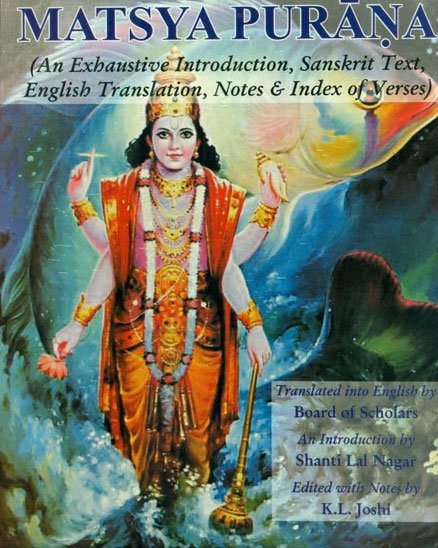The Matsya Purana (critical study)
by Kushal Kalita | 2018 | 74,766 words | ISBN-13: 9788171103058
This page relates ‘Lunar Dynasty’ of the English study on the Matsya-purana: a Sanskrit text preserving ancient Indian traditions and legends written in over 14,000 metrical verses. In this study, the background and content of the Matsyapurana is outlined against the cultural history of ancient India in terms of religion, politics, geography and architectural aspects. It shows how the encyclopedic character causes the text to deal with almost all the aspects of human civilization.
Part 2.1c - The Lunar Dynasty
The base of this dynasty is a popular Purāṇic myth. The myth was that Vaivasvata Manu’s eldest son Ila turned in to a woman—Ilā. Ilā had a son called Purūravas Aila from Budha, who was the son of Candra. Purūravas Aila is regarded as the progenitor of the Lunar Dynasty or Candravaṃśa and his lineage, Aila race ruled at Pratiṣṭhāna, the capital of Madhyadeśa. Kānyakubjas, Yādavas, Anavas, Druhyus, Pāñcālas, Bṛhadrathas, Cedīs etc. were the most prominent branches of Lunar dynasty.
According to the Matsyapurāṇa, Purūravas had eight sons.[1] They were Āyu, Dṛḍhāyu, Aśvāyu, Dhanāyu, Dhṛtimān, Vasu, Śucividya and Śatāyu. Among them only two were famous for their works. They were Āyu and Vasu. Purūravas was succeeded by his eldest son Āyu at Pratiṣṭhāna. Vasu, founded a kingdom with its capital at Kānyakubja. Āyu had five valiant sons, viz., Nahuṣa, Vṛddhaśarmā, Raji, Dambha, and Vipāpmā.[2] The eldest son Nahuṣa succeeded after his father at Pratiṣṭhāna. Bṛddhasarmā, another son of Āyu founded the dynasty that reigned in Kāśī.[3] King Nahuṣa had seven pious sons. They were -Yati, Yayāti, Samyāti, Udbhava, Pāci, Śaryāti, Meghāyati.[4] After Nahuṣa Yayāti became the king.[5] Known as the great conqueror, king Yayāti conquered the whole Madhyadeśa and extended the frontiers of his kingdom to the north-west, to the countries of west south and south -east of his territory of Pratiṣṭhāna. He had five sons from his two wives Devayānī and Śarmiṣṭhā. From Devayānī he begot two sons, Yadu and Turvasu. From Śarmiṣṭhā, Yayāti begot three sons, viz., Druhya, Anu and Puru.[6] He divided his territories among these five princes.
Puru, the youngest son of Yayāti had been given the responsibility to rule over Madhyadeśa which is in between the rivers Ganges and Yamunā [7] Due to not obeying their father’s commands Yayāti deprived Yadu, Turvasu, Druhya and Anu from the empire of Madhyadeśa.[8] Under the rule of Puru these elder brothers were given the bordering countries of the Madhyadeśa.[9] Yadu became the founder of Yādava dynasty, Turvasu became the founder of Yavanas, Druhya begot Bhojas and Anu begot the Mlecchas.[10] Puru became the founder of the Paurava dynasty.[11] Among the kingdoms of five sons of Yayāti the kingdom of Yadu and Puru had got the name and fame.
Footnotes and references:
[1]:
Ibid.,24.33
[2]:
Ibid.,24.34
[3]:
Ibid.,24.33-35
[4]:
Ibid.,24.50
[5]:
,24.51
[6]:
,24.53
[7]:
[8]:
Ibid., 34.19-20
[9]:
Ibid., 36.6
[10]:
